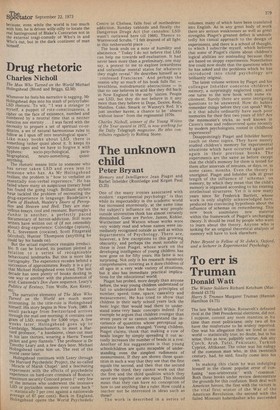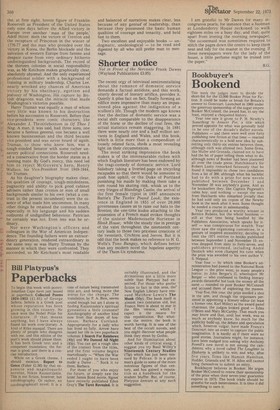To err is Truman
Donald Watt
The Winter Soldiers Richard Ketchum (Macdonald £3.75) Harry S. Truman Margaret Truman (Hamish Hamilton £4.75) The late Wendell Wilkie, Roosevelt's defeated rival at the 1940 Presidential elections, did not, I suppose, commit any more inanities in his time than most politicians; only two of his have the misfortune to be widely reported. One was his allegation that we lived in one world — statistically true, no doubt, but in his sense, then as now, palpably untrue. Ask any Czech, Arab, Tutsi, Pakistani, Turkish Cypriot, Afrikaner. The other was his eulogy of the common man who, in this twentieth century, had, he said, finally come into his own.
In making this claim he was indulging himself in the classic populist error of confusing ' non-aristocratic ' with 'common.' Both these books under review demonstrate the grounds for this confusion. Both deal with American heroes, the first with the victors in the vital first winter of the War of the American Revolution, the second with the failed Missouri haberdasher who succeeded
the, at first sight, heroic figure of Franklin Roosevelt as President of the United States only nine days before the Allied victory in Europe over another ' man of the people,' Adolf Hitler. Both the victors ot Trenton and the recapture of Princeton in the winter of 1776-77 and the man who presided over the victory in Korea, the Berlin blockade and the salvation of western Europe from famine and despair came from very ordinary hitherto undistinguished backgrounds. The record of the thirteen colonies in social responsibility was, as Mr Ketchum makes graphically clear, absolutely abysmal. And the only experienced professional soldier with a background of training in military leadership, Charles Lee, nearly wrecked any chances of American victory by his obstinacy, egotism and jealousy of Washington. His capture by British dragoons was the miracle that made Washington's victories possible.
Harry Truman was equally a man of whom very little was known to his destruction before his succession to Roosevelt. Before that vice-presidents were comic characters, like Alexander J. Throttlebottom in Of Thee I Sing. A man, it was said, had three sons, one became a famous general, one became a well known businessman and the third became vice-president and was never heard of again, Truman, to those who knew him, was a tough-minded Senator with some rather unsavory political connections. Roosevelt needed a conservative from the border states as a running mate. By God's mercy, this need led him to reject McGovern's hero, Henry Wallace, his Vice-President from 1949-1944, tor Truman.
As his daughter's biography makes clear, his qualities of courage, tough-mindedness, pugnacity and ability to pick good cabinet advisers rather than cronies or men of small backgrounds similar to his own (what a contrast to the present incumbent) were the essence of what made him uncommon. In many other things he retained the common touch, especially in his language and his sudden outbursts of undignified behaviour. Patrician he certainly was not. Even less was he ordinary.
Nor were Washington's officers and colleagues in the War of American Independence. The founding fathers were an extraordinary generation, rendered extraordinary in the same way as was Harry Truman by the manner in which they were confronted. They succeeded, so Mr Ketchum's most readable and balanced of narratives makes clear, less because of any genius' of leadership, than because they possessed the basic human qualities of courage and tenacity, and held fast to them.
Two excellent and enjoyable books — un-dogmatic, unideological — to be read and digested by all who still prefer man to message.



































 Previous page
Previous page